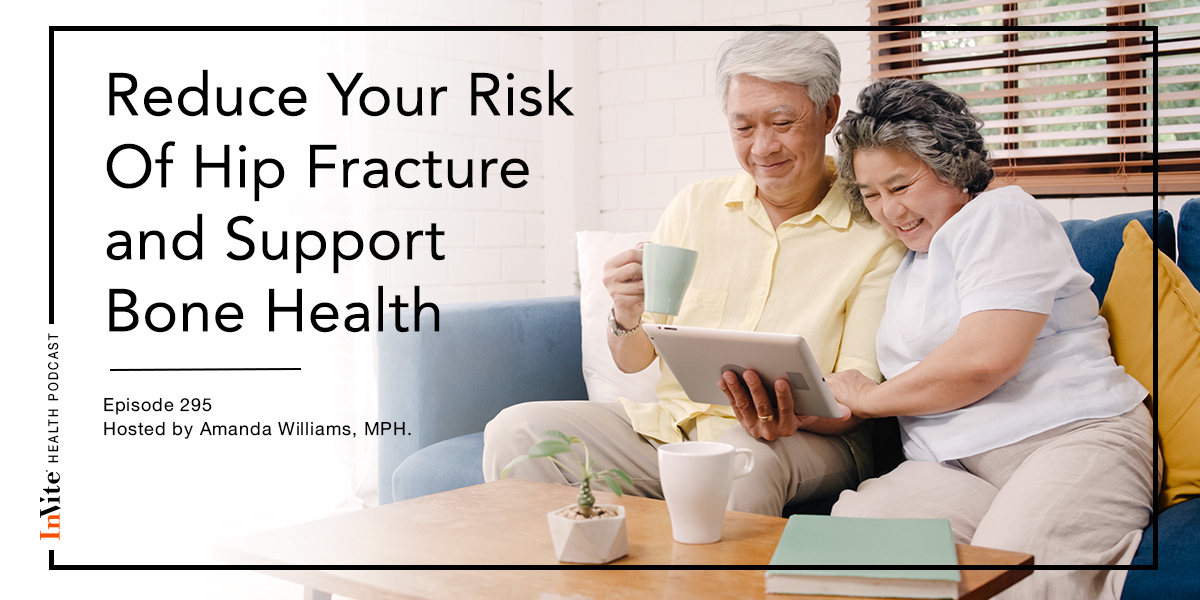Reduce Your Risk Of Hip Fractures & Support Bone Health – InVite Health Podcast, Episode 295

hip fracture
Invite Health Podcast, Episode hosted by Jerry Hickey. Ph
Subscribe Today!
Hip fractures are dangerous, painful and expensive to treat. They require many months of physical therapy to help rebuild tissues. They’re pretty common, so how do you reduce your risk of a hip fracture? You have to help solidify your bones and today, we’re going to discuss nutrients that can help you do that.
Important nutrients for maintaining bone health
There are a number of nutrients needed to maintain and build bone. Bone building takes place at night, so if you’re not sleeping at night, you really should look into melatonin. Research shows that melatonin is core to building and maintaining bone. This becomes incredibly important as people age, when there’s a risk of a decline in melatonin release. There’s a gland on the bottom-middle of the brain called the pineal gland and when it starts to get dark, it starts to release some melatonin that sets you up for sleep, but melatonin is involved with many important health functions, including immune system function, controlling blood pressure and building bone.
There are some nutrients on the periphery of bone building, like zinc and beta carotene, but there are others that are core. We start with collagen, which is a protein that the body makes, and it is the framework of the bone. We call it the organic matrix. 90% of this organic matrix, which accounts for 35 to 40% of your bone, is made out of collagen. The problem is that we make less collagen with age, so older people might want to take some type 1 collagen to help maintain their bones. That’s exactly what calcium attaches to.
Then, you need Vitamin D. What does Vitamin D do for bones? It does several things. First of all, it allows you to absorb calcium from your digestive tract. Vitamin D is required to absorb calcium from food and from supplements and to keep it available. Then, you need Vitamin K to shove calcium into the bone and magnesium to solidify the connection between the calcium and the collagen to keep the calcium in your bone. It’s not just as simple as Vitamin D and calcium or a drug. You also need collagen.
How does calcium connect to collagen? It’s an interaction between hormones, the mineral silica, Vitamin K and Vitamin D. They do a kind of dance in and out of the collagen and make receptor sites that the calcium can attach to. About 36% of your bone is collagen and some of the estimates for calcium are between 15 to 35% of your bone. You need Vitamin D to absorb the calcium. You need Vitamin D with Vitamin K and silica that interact with the collagen to create receptor sites for the calcium. You need Vitamin K to shove calcium into the bone and you need magnesium to solidify the bond between the calcium and the collagen so that you maintain your bone.
All of those nutrients are important and you also need potassium from fruits and vegetables to keep your blood a little bit alkaline. If the blood gets acidic, the blood has to borrow minerals from the bone. Having an acidic diet lacking in fresh fruits and vegetables can lead to bone loss.
Tune into the full podcast episode to hear about studies relating to nutrients that are important for bone health.
Facing age-related bone loss and hip fractures
What do you do when facing age related-bone loss and trying to prevent hip fractures? We know that exercise is important for bone building. Exercise promotes the activity inside the bone marrow, but it also strengthens the bone. If you do sweaty exercise, you can actually lose bone, unless you take a bone formula beforehand. Your blood has to have a certain level of electrolytes, like potassium, sodium, chloride, calcium and magnesium. When you sweat, you lose them. If you don’t have enough electrolytes, it’s very dangerous, so the body borrows the electrolytes from your bones. However, if you take a bone formula before you do sweaty exercise, there are enough electrolytes floating around in the bloodstream temporarily that the body won’t borrow them from the bones.
Why Strontium Is An Important Mineral For Bone Health – InVite Health Podcast, Episode 257 Listen Now >>
You build bone when you sleep and melatonin is a big part of that, so if you’re not sleeping at night, take some melatonin. The studies show that 3mg of melatonin before bedtime is the perfect amount. Take a formula that’s clean, like our Bone Powder, that’s going to have all of these different ingredients to build bone.
Are your currently experiencing bone loss or have experienced hip fractures? Leave a comment below to join the discussion.
Thank you for tuning in to the Invite Health Podcast. You can find all of our episodes for free wherever you listen to podcasts or by visiting www.invitehealth.com/podcast. Make sure you subscribe and leave us a review! Follow us on Facebook, Twitter and Instagram at Invite Health today. We’ll see you next time on another episode of the Invite Health Podcast.


